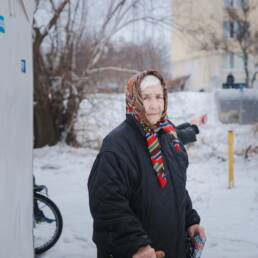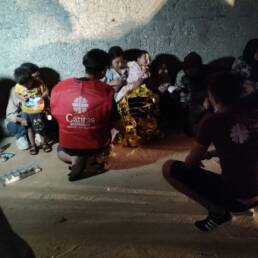Our new position paper raises concerns about the EU’s increased attempts to close its borders to migrants and to outsource asylum responsibilities to non-EU countries.
We analysed the risks of the two instruments the European Council proposed to deal with migrants rescued at sea: “disembarkation arrangements” (potentially outside of the EU) and “controlled centres” (on EU soil). Our recommendations to the EU institutions and Members States aim at preserving the EU’s asylum and human rights responsibilities.
On the regional disembarkation arrangement
We fear that under the concept of the “regional disembarkation mechanism”, several Member States aim at creating offshore processing centres in non-EU countries where migrants rescued at sea would be disembarked to analyse their asylum claims. Several Member States hope that by externalising their asylum policies to non-EU countries, they will not have to invest in improving their own asylum systems.
As Caritas Europa, we believe that the EU’s asylum responsibilities cannot be shifted to non-EU countries and that offshore processing centres should never be implemented. The right to spontaneously apply for asylum in the EU should be protected, and the EU and its Member States must increase safe and legal pathways to Europe for those in need of protection.
Instead of trying to create offshore processing centres outside the EU and closing our ports to rescued boats, a fair, transparent and efficient disembarkation mechanism should be set up in the EU. More efforts should also be made to step up search and rescue operations in the central Mediterranean Sea, instead of obstructing NGOs in their rescue operations.
Furthermore, cooperation with northern African countries on border control, migration management and return should not turn a blind eye on migrants’ needs and human rights and must always respect the principle of non-refoulement.
On the controlled centres
The EU proposals also aim at establishing so-called “controlled centres” that seem to be very similar to the current hotspots in Greece and Italy. Given the deplorable and degrading conditions affecting the health and psychological stability of migrants in several hotspots, we are worried that controlled centres could in fact replicate that suffering.
The efforts to make asylum and return procedures faster must in no way come at the expense of procedural safeguards nor of the Geneva Convention. We are also firmly against arbitrary and indefinite detention.
Therefore, we call for a reform of the Common European Asylum System to ensure responsibility sharing and solidarity among Member States in welcoming refugees in Europe.
For more information about cooperation with non-EU countries, read our opinion piece in Euractiv and CONCORD’s article in Politico.
More information
Leïla Bodeux
Senior Policy and Advocacy Officer
Tel: +32 (0)2 235 26 55
Mob: +32 (0)478 585 409
lbodeux@caritas.eu




